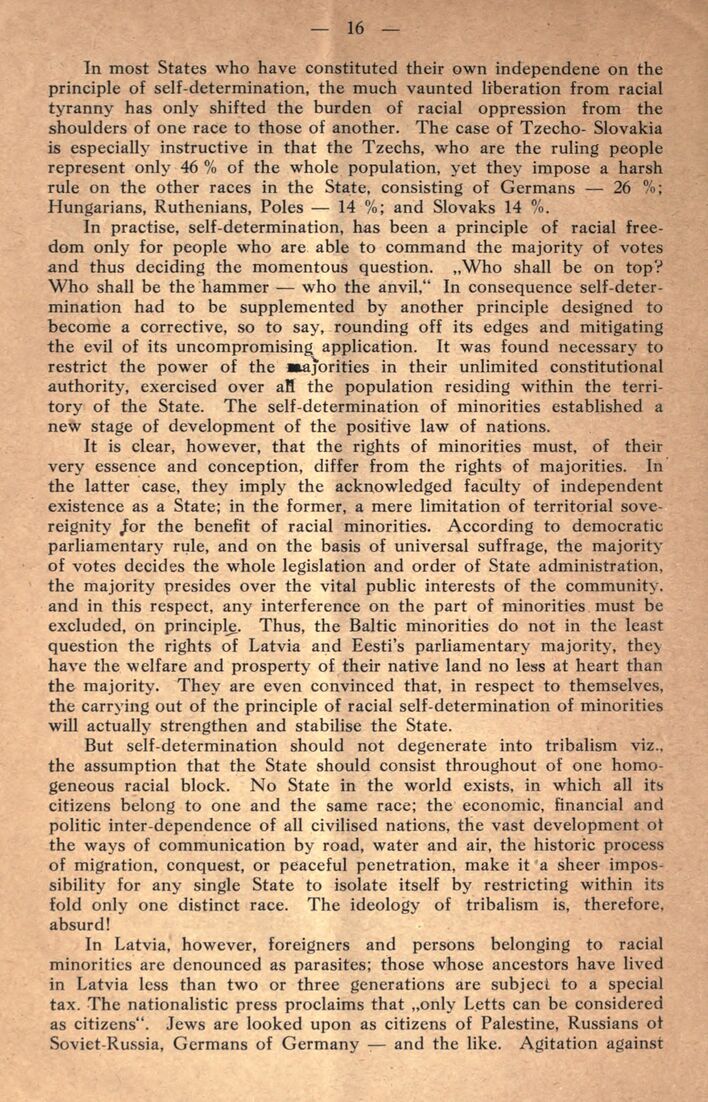
Full resolution (JPEG) - On this page / på denna sida - Chapter II. The Baltic Minorities' Rights. Their relation to Municipal and International Law. Lecture delivered at the Grotius Society in London, November 1921

<< prev. page << föreg. sida << >> nästa sida >> next page >>
Below is the raw OCR text
from the above scanned image.
Do you see an error? Proofread the page now!
Här nedan syns maskintolkade texten från faksimilbilden ovan.
Ser du något fel? Korrekturläs sidan nu!
This page has been proofread at least once.
(diff)
(history)
Denna sida har korrekturlästs minst en gång.
(skillnad)
(historik)
In most States who have constituted their own independence on the
principle of self-determination, the much vaunted liberation from racial
tyranny has only shifted the burden of racial oppression from the
shoulders of one race to those of another. The case of Tzecho- Slovakia
is especially instructive in that the Tzechs, who are the ruling people
represent only 46 % of the whole population, yet they impose a harsh
rule on the other races in the State, consisting of Germans — 26 %;
Hungarians, Ruthenians, Poles — 14 %; and Slovaks 14 %.
In practise, self-determination, has been a principle of racial
freedom only for people who are able to command the majority of votes
and thus deciding the momentous question. „Who shall be on top?
Who shall be the hammer — who the anvil.“ In consequence
self-determination had to be supplemented by another principle designed to
become a corrective, so to say, rounding off its edges and mitigating
the evil of its uncompromising application. It was found necessary to
restrict the power of the majorities in their unlimited constitutional
authority, exercised over all the population residing within the
territory of the State. The self-determination of minorities established a
new stage of development of the positive law of nations.
It is clear, however, that the rights of minorities must, of their
very essence and conception, differ from the rights of majorities. In
the latter case, they imply the acknowledged faculty of independent
existence as a State; in the former, a mere limitation of territorial
sovereignity for the benefit of racial minorities. According to democratic
parliamentary rule, and on the basis of universal suffrage, the majority
of votes decides the whole legislation and order of State administration,
the majority presides over the vital public interests of the community,
and in this respect, any interference on the part of minorities must be
excluded, on principle. Thus, the Baltic minorities do not in the least
question the rights of Latvia and Eesti’s parliamentary majority, they
have the welfare and prosperty of their native land no less at heart than
the majority. They are even convinced that, in respect to themselves,
the carrying out of the principle of racial self-determination of minorities
will actually strengthen and stabilise the State.
But self-determination should not degenerate into tribalism viz.,
the assumption that the State should consist throughout of one
homogeneous racial block. No State in the world exists, in which all its
citizens belong to one and the same race; the economic, financial and
politic inter-dependence of all civilised nations, the vast development ot
the ways of communication by road, water and air, the historic process
of migration, conquest, or peaceful penetration, make it a sheer
impossibility for any single State to isolate itself by restricting within its
fold only one distinct race. The ideology of tribalism is, therefore,
absurd!
In Latvia, however, foreigners and persons belonging to racial
minorities are denounced as parasites; those whose ancestors have lived
in Latvia less than two or three generations are subject to a special
tax. The nationalistic press proclaims that „only Letts can be considered
as citizens“. Jews are looked upon as citizens of Palestine, Russians ot
Soviet-Russia, Germans of Germany — and the like. Agitation against
<< prev. page << föreg. sida << >> nästa sida >> next page >>